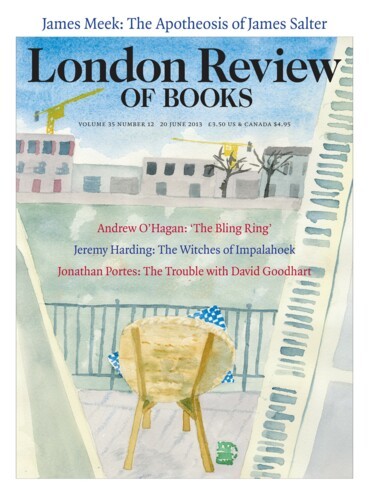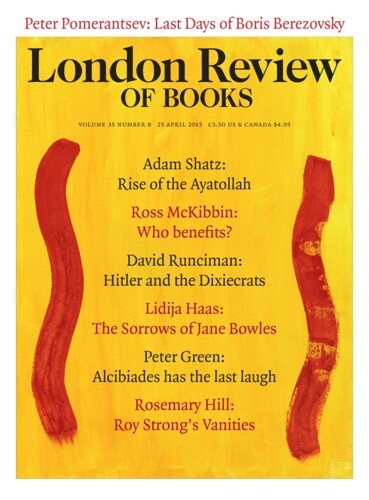The aim of the ‘limited war’ as set out by the United States and its European vassals is simple. The Syrian regime was slowly re-establishing its control over the country against the opposition armed by the West and its tributary states in the region (Saudi Arabia and Qatar). This situation required correction. The opposition in this depressing civil war needed to be strengthened militarily and psychologically. Since Obama had said chemical weapons were the ‘red line’, the weapons were bound to come into play. Cui prodest? as the Romans used to inquire. Who profits? Clearly, not the Syrian regime.
Tariq Ali
Tariq Ali is the author of many books, including Street-Fighting Years, Clash of Fundamentalisms: Crusades, Jihads and Modernity, The Dilemmas of Lenin and Winston Churchill: His Times, His Crimes. He is on the editorial committee of New Left Review. He has written more than fifty pieces for the LRB, on cricket, Pakistan, Afghanistan, Kashmir, Corbyn, the Bhuttos, Victor Serge and the conflicts of recent decades. He also discussed his political formation in an interview with David Edgar.
Mercifully, I was in South India for two events that showed the English at their worst: a long-delayed sporting triumph and the arrival of George Alexander Louis. So I missed the response to Andy Murray’s win at Wimbledon and the eruption that greeted the birth of yet another royal. Before these there was the ‘multicultural triumph’ of the Olympics, followed recently by the ‘illegal immigrant’ buses and non-white citizens being stopped at railway stations. Even the UKIP leader denounced this as not being ‘the British way’.
The Filthy Rich Election: Pakistan’s New Rulers
Tariq Ali, 20 June 2013
Not long before last month’s elections, dozens of workers (the youngest was 12) were burned to death in factory fires in Karachi and Lahore. Pakistan’s rulers were unmoved: there were token expressions of regret but no talk of tough new laws being passed after the election. There is barely any safety regulation in Pakistan, and if any legislation does impede business a modest...
How it changes. When I was in Istanbul last April the mood was sombre. Even the most ebullient of friends were downcast. The latent hostility to the regime was always present, but the AKP’s hegemony, I was told many times, went deep. Erdoğan was a reptile, cynical but clever and not averse to quoting the odd verse from Nâzım Hikmet, the much-loved communist poet imprisoned by Atatürk. The poet had escaped in a boat and been rescued by a Soviet tanker. ‘Can you prove you’re Hikmet,’ the captain asked him. He laughed and pointed to a poster in the captain’s cabin which had his photograph on it. He died in Moscow in 1963. His remains are still in exile.
Short Cuts: Trouble in Sri Lanka
Tariq Ali, 25 April 2013
Four years after the killing of between eight and ten thousand Tamils by the Sri Lankan army, which brought to an end a civil war that had lasted for 26 years, there is trouble on the island again. This time the army isn’t directly responsible: instead it’s the Buddhist monks from Bodu Bala Sena, the most active of the fundamentalist groups that have sprouted in Sinhalese...
Podcasts & Videos
Muhammad, Cervantes and the Algarve
Tariq Ali and Thomas Jones
Tariq Ali talks to Thomas Jones about a newly reissued biography of the Prophet by Maxime Rodinson, and the historic prevalence of Arabic culture in the West, from Don Quixote to Trafalgar Square.
Diary: In Pyongyang
Tariq Ali
Tariq Ali reads extracts from his diary about visiting Pyongyang.
The New World Disorder
Tariq Ali
Tariq Ali delivers his 2015 LRB Winter Lecture, in which he argues that we are living in the twilight period of democracy
Alexander Zevin talks to Tariq Ali about his new book, Liberalism at Large, a critical biography of the Economist magazine and an examination of liberalism.
Pieces about Tariq Ali in the LRB
Bad Times: Travels with Tariq Ali
Andy Beckett, 20 February 2025
For a lifelong opponent of the establishment, Tariq Ali gets on strikingly well with some of its members: those diplomats, spooks and former spooks who think seriously, as he sees it, about the arrangement...
Baseball’s Loss: The Unstoppable Hugo Chávez
Geoffrey Hawthorn, 1 November 2007
In Venezuela at the end of June, Evo Morales, Hugo Chávez and Diego Maradona, three heroes of the people in Latin America, kicked off the Copa América. Morales, pleased with his...
I prefer to be an Ottoman: Tariq Ali
Justin Huggler, 30 November 2000
No country in the Islamic world has embraced the West as eagerly as Turkey has, which makes it an intriguing setting for the third novel in Tariq Ali’s Islamic Quartet: a series of...
Acts of Violence in Grosvenor Square: Memoirs of a Revolutionary
Christopher Hitchens, 4 June 1998
I was just beginning to write about 1968 when I learned of the death in New Orleans of Ron Ridenhour, the GI who exposed the massacre at My Lai. He was only 52, which means that he was in his...
Here is a little family
Amit Chaudhuri, 9 July 1992
The narrator of After Silence is Max Fischer, the famous cartoonist. At the Los Angeles County Museum, where his work is on display, his life collides with that of Lily Aaron, a divorcee with a...
When students ruled the earth
D.A.N. Jones, 17 March 1988
Twenty years is a long time in politics. To me, the flavour of the year 1968 is still ‘anti-Fascism’. The meanings of ‘Fascism’ and ‘National Socialism’ are...
Read anywhere with the London Review of Books app, available now from the App Store for Apple devices, Google Play for Android devices and Amazon for your Kindle Fire.
Sign up to our newsletter
For highlights from the latest issue, our archive and the blog, as well as news, events and exclusive promotions.



